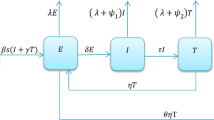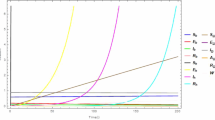Abstract
After the outbreak of coronavirus disease, numerous models have been proposed for it. In this paper, a fractional mathematical model for COVID-19 is introduced. Applying generalized Bessel polynomials, each function in the model is approximated. For minimizing the norm-2 of residual functions, an optimization problem is obtained and this problem is solved using Lagrange multipliers. The numerical results shows that the proposed method has high accuracy and is suitable for solving nonlinear optimization problems and also can help specialists to cure and control Covid-19 disease.




Similar content being viewed by others
References
Abdo MS, Shah K, Wahash HA, Panchal SK (2020) On a comprehensive model of the novel coronavirus (COVID-19) under Mittag–Leffler derivative. Chaos Solitons Fractals. https://doi.org/10.1016/j.chaos.2020.109867
Abir MH, Gani MO, Mandal S, Ali Biswas MH (2020) Modeling the dispersal effect to reduce the infection of COVID-19 in Bangladesh. Sens Int. https://doi.org/10.1016/j.sintl.2020.100043
Ahmed S, Shah K, Jahan S, Abdeljawad T (2023) An efficient method for the fractional electric circuits based on Fibonacci wavelet. Results Phys 52:106753–106753
Ali HM, Ameen IG (2021) Optimal control strategies of a fractional order model for Zika virus infection involving various transmissions. Chaos Solitons Fractals. https://doi.org/10.1016/j.chaos.2021.110864
Alkahtani BST, Alzaid SS (2020) A novel mathematics model of COVID-19 with fractional derivative. Chaos Solitons Fractals Stab Numer Anal. https://doi.org/10.1016/j.chaos.2020.11000
Alla Hamou A, Azroul E, Hammouch Z, Alaoui AL (2021) A fractional multi-order model to predict the COVID-19 outbreak in Morocco. Appl Comput Math 20(1):177–203
Altomare M, Costabile FA (2017) A new determinant form of Bessel polynomials and applications. Math Comput Simul 141:16–23
Ansari A (2017) Riesz fractional derivatives of solutions of differential equation y(4) + xy = 0. Stud Sci Math Hung 54(2):205–220
Árpád Baricz, Nemes G (2021) Asymptotic expansions for the radii of starlikeness of normalised Bessel functions. J Math Anal Appl 494(2):124624–124624
Ashirai TB, Hove-Musekwa SD, Mushayabasa S (2021) Optimal control applied to a fractional-order foot-and-mouth disease model. Int J Appl Comput Math. https://doi.org/10.1007/s40819-021-01011-8
Baleanu D, Golmankhaneh AK, Golmankhaneh AK, Baleanu MC (2009) Fractional electromagnetic equations using fractional forms. Int J Theor Phys 48(11):3114–3123
Batistela Cristiane M, Diego Bueno, ÁM, Piqueira José RC (2021) SIRSi-vaccine dynamical model for COVID-19 pandemic. ArXiv (Cornell University). https://doi.org/10.48550/arxiv.2104.07402
Biswas MHA, Khatun MS et al (2022) Optimal control strategy to com- bat the spread of COVID-19 in absence of effective vaccine. J Appl Math Inf 40(3–4):633–656
Das M, Samanta G, De la Sen M (2021) Stability analysis and optimal control of a fractional order synthetic drugs transmission model. Mathematics. https://doi.org/10.3390/math9070703
Diethelm K (2010) The analysis of fractional differential equations. Springer-Verlag, Berlin
Hamed Keramati, Birgersson E, Kim S, Ho JP, Liang Leo Hwa (2022) Using a reduced-order model to investigate the effect of the heart rate on the aortic dissection. Int J Numer Methods Biomed Eng. https://doi.org/10.1002/cnm.3596
Hassani H, Avazzadeh Z, Machado JAT (2019) Numerical approach for solving variable-order space-time fractional telegraph equation using transcendental Bernstein series. Eng Comput. https://doi.org/10.1007/s00366-019-00736-x
Hassani H, Tenreiro Machado JA, Mehrabi S (2021) An optimization technique for solving a class of nonlinear fractional optimal control problems: application in cancer treatment. Appl Math Model 93:868–884
Hassani H, Machado JAT, Avazzadeh Z, Safari E, Mehrabi S (2021) Optimal solution of the fractional order breast cancer competition model. Sci Rep. https://doi.org/10.1038/s41598-021-94875-1
Hassani H, Machado JAT, Avazzadeh Z, Naraghirad E, Mehrabi S (2022) Optimal solution of the fractional-order smoking model and its public health implications. Nonlinear Dyn 108(2):10–17
Heydari MH, Atangana A, Avazzadeh Z (2019) Chebyshev polynomials for the numerical solution of fractal-fractional model of nonlinear Ginzburg–Landau equation. Eng Comput 37(2):1377–1388
Hifler R (2000) Applications of fractional calculus in physics. Word Scientific, Singapore
Hosseininia M, Heydari MH, Avazzadeh Z (2020) The numerical treatment of nonlinear fractal-fractional 2D Emden–Fower equation utilizing 2D Chelyshkov polynomials. Fractals 28(08):2040042–2040042
Hu P-C, Yang C-C (2010) A linear homogeneous partial differential equation with entire solutions represented by Bessel polynomials. J Math Anal Appl 368(1):263–280
Kheiri H, Jafari M (2018) Optimal control of a fractional-order model for the HIV/AIDS epidemic. Int J Biomath. https://doi.org/10.1142/s1793524518500869
Komarov MA (2020) Rate of approximation of zf’(z) by special sums associated with the zeros of the Bessel polynomials. Indag Math 31(3):450–457
Kreyszig E (1978) Introductory functional analysis with applications. John Wiley and Sons Inc, New York
Lenka BK, Bora SN (2022) Lyapunov stability theorems for \(\psi\)-Caputo derivative systems. Fract Calc Appl Anal
Li L-L, Li F, Gross FB (2006) A new polynomial approximation for Jv Bessel functions. Appl Math Comput 183(2):1220–1225
Luis López José, Temme NM (2011) Large degree asymptotics of generalized Bessel polynomials. J Math Anal Appl 377(1):30–42
Machado JT, Kiryakova V, Mainardi F (2011) Recent history of fractional calculus. Commun Nonlinear Sci Numer Simul 16(3):1140–1153
Murray JD (2002) Mathematical biology. Interdisciplinary applied mathematics. New York
Natalini P, Emilio Ricci Paolo (2015) Bell polynomials and modified Bessel functions of half-integral order. Appl Math Comput 268:270–274
Nikan O, Avazzadeh Z, Tenreiro Machado JA (2021) A local stabilized approach for approximating the modified time-fractional diffusion problem arising in heat and mass transfer. J Adv Res 32:45–60
Nishant NB, Bhatter S et al (2023) Some fractional calculus findings associated with the product of incomplete-function and Srivastava polynomials. Int J Math Comput Eng. https://doi.org/10.2478/ijmce-2024-0008
Parand K, Nikarya M (2014) Application of Bessel functions for solving differential and integro-differential equations of the fractional order. Appl Math Model 38(15–16):4137–4147
Pourbabaee M, Saadatmandi A (2019) A novel Legendre operational matrix for distributed order fractional differential equations. Appl Math Comput 361:215–231
Rudin W (1987) Real and complex analysis, 3d edn. McGraw-Hill Book Company, New York
Saleem MU, Farman M, Ahmad A, Haque EU, Ahmad MO (2020) A Caputo Fabrizio fractional order model for control of glucose in insulin therapies for diabetes. Ain Shams Eng J. https://doi.org/10.1016/j.asej.2020.03.006
Singh R, Mishra J, Kumar Gupta Vijay (2023) Dynamical analysis of a tumor growth model under the effect of fractal fractional Caputo–Fabrizio derivative. Int J Math Comput Eng 1(1):115–126
Sivalingam SM, Kumar P, Govindaraj V (2023) A novel numerical scheme for fractional differential equations using extreme learning machine. Phys A 622:128887–128887
Şuayip Yüzbaşı, Niyazi Şahın, Sezer M (2011) Numerical solutions of systems of linear Fredholm integro-differential equations with Bessel polynomial bases. Comput Math Appl 61(10):3079–3096
Suresh CM, Pinki L, Manisha M (2023) A study of signal processing with fractional calculus. Eur Chem Bull 12(9):2858–2869
Sweilam NH, AL-Mekhlafi SM, Baleanu D, (2019) Optimal control for a fractional tuberculosis infection model including the impact of diabetes and resistant strains. J Adv Res 17:125–137
Yang X-J, Abdel-Aty M, Cattani C (2019) A new general fractional-order derivataive with Rabotnov fractional-exponential kernel applied to model the anomalous heat transfer. Therm Sci 23(3 Part A):1677–1681
Zadi M, Srivastava HM (2021) Numerical approximations to the nonlinear fractional-order Logistic population model with fractional-order Bessel and Legendre bases. Chaos Solitons Fractals. https://doi.org/10.1016/j.chaos.2021.110779
Funding
The authors have not disclosed any funding.
Author information
Authors and Affiliations
Corresponding author
Ethics declarations
Conflict of interest
The authors have not disclosed any conflict of interest.
Rights and permissions
Springer Nature or its licensor (e.g. a society or other partner) holds exclusive rights to this article under a publishing agreement with the author(s) or other rightsholder(s); author self-archiving of the accepted manuscript version of this article is solely governed by the terms of such publishing agreement and applicable law.
About this article
Cite this article
Saeidi, H., Dahaghin, M.S., Mehrabi, S. et al. Bessel Polynomials: Application in Finding Optimal Solution of Fractional COVID-19 Model Using Lagrange Multipliers. Iran J Sci (2024). https://doi.org/10.1007/s40995-024-01632-w
Received:
Accepted:
Published:
DOI: https://doi.org/10.1007/s40995-024-01632-w




